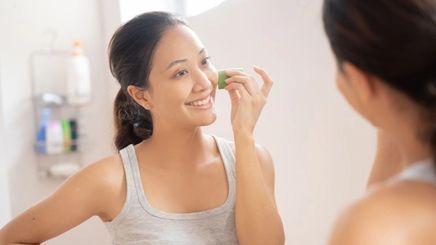
People have been using aloe vera in skin care for centuries. The Egyptians called it “the plant of immortality” because of its medicinal properties. Cleopatra also allegedly used it regularly to keep her skin smooth and soft. If you’re wondering how to use aloe vera on your face, here are seven ways to do it.
Acne Treatment
Did you know that — AVG to the cool kids — contains salicylic acid, a BHA known for reducing acne? controls sebum production in the pores and gently exfoliates the skin. This process prevents acne from forming by keeping the pores unobstructed by debris.
Using aloe vera for acne can be effective, according to the National Center for Complementary and Integrative Health. Some people use aloe vera gel as an overnight spot treatment to minimize bigger pimples. Make sure to wash it off in the morning. Consult your dermatologist before applying any treatment on your face to avoid allergic reactions and irritation.
Moisturizer
In the old days, moms and lolas extracted aloe vera gel straight from the plant. After disinfecting a knife, they would slice off a leaf, cut it open, and scrape the gel out. While this is still a more interesting way to get aloe vera, you could also just buy the gel, which is now sold in tubs, at most beauty stores.
You can use this gel as a lightweight, soothing moisturizer. Research published in the National Library of Medicine found that AVG is effective at promoting skin integrity and retaining moisture. Again, perform a patch test before applying the gel to your face to make sure you’re not allergic. Before using it on areas with dermatitis or eczema, ask your doctor first.
Hydrating Mask
Because aloe vera has soothing, anti-inflammatory, and hydrating properties, it’s an excellent ingredient for face masks. You can use the gel itself or try products with aloe vera as the main ingredient. These include gel moisturizers and sheet masks.
POND'S Aloe Vera Jelly Moisturizer addresses dry, dull, and dehydrated skin with 100% natural origin aloe vera extract and . You can use it as a moisturizer or apply a thicker layer as a night mask for smooth, supple skin.
Pre-Cleanse
If you like , you can use aloe vera gel as your first step. Because of its texture and consistency, AVG can work as a hydrating for light foundations and powders. Use it to loosen any product from your skin without stripping away moisture. Fair warning: it won’t take mascara and other long-wearing products off, so always finish with a proper cleansing routine.
Complete your AVG cleansing journey with POND'S Aloe Vera Jelly Cleanser, which gently cleanses the skin of impurities while minimizing pores. It’s 100% alcohol- and paraben-free and is suitable for all skin types.
Face Depuffer
Instead of sliced cucumbers, try depuffing your undereye area with aloe vera gel. Store a tub of clean, uncontaminated AVG in the refrigerator to keep it cool. When you want some R&R, scoop out a generous amount and slather it around your eyes and on your cheeks. You can even cover your eyes with a damp cotton pad to prevent the gel from sliding into them. Leave the gel on for 10 minutes and rinse off.
Face Massage Prep
Slimy aloe vera gel is also an excellent alternative to face oils. You can use AVG to prep your skin for a . Cover your face with a thin layer of gel to help your hands or massage tools glide better and prevent too much friction. You can use a gua sha, face roller, or your fingers to release tense muscles.
Scar Lightener
A 2016 study published in the Annals of Plastic Surgery notes that topical use of aloe vera gel can accelerate wound healing and help lighten scars. It found that applying AVG on the surface wound for 10 days straight decreased the size of scar tissue and helped increase the level of collagen in the area. Manage your expectations, though. It won’t fix deep or pitted acne scars. At best, AVG can encourage wound healing and fade . Do not apply the gel to deep wounds and burns.
Learn how to use aloe vera gel on your face and discover the wonders of this OG skincare ingredient. As always, when in doubt, ask your dermatologist first.